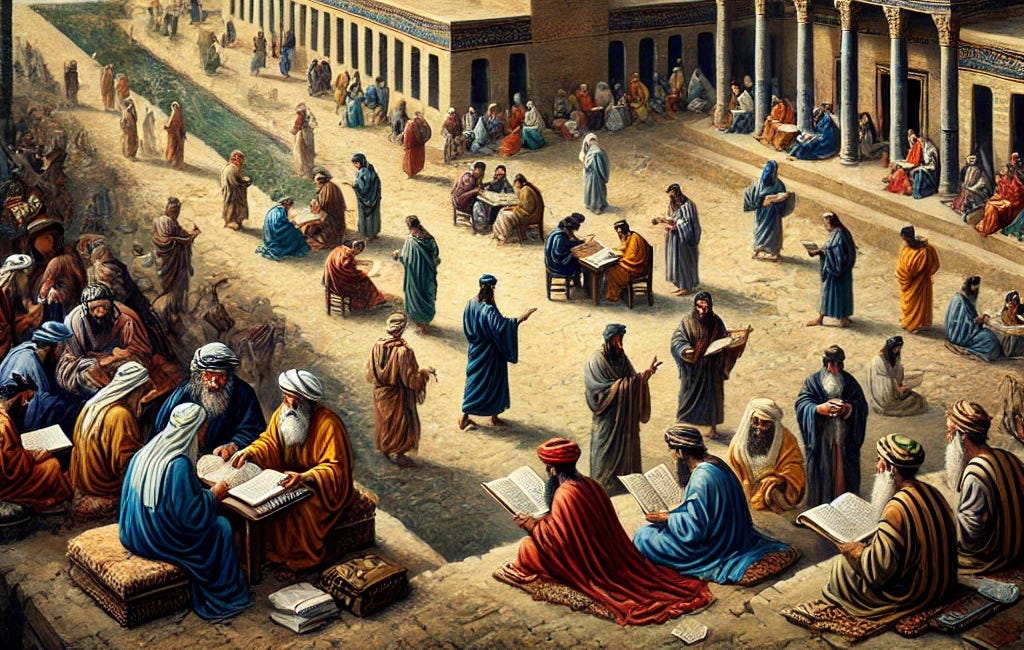Indeed, Rav didn't cite Pumbeditan Variants
Yesterday, I wrote a brief post about Sanhedrin 28, where the Artscroll and Koren translations rendered a passage in different ways.
רַב אִיקְּלַע לְמִזְבַּן גְּוִילֵי. בְּעוֹ מִינֵּיהּ: מַהוּ שֶׁיָּעִיד אָדָם בְּאֵשֶׁת חוֹרְגוֹ? בְּסוּרָא אָמְרִי: בַּעַל כְּאִשְׁתּוֹ. בְּפוּמְבְּדִיתָא אָמְרִי: אִשָּׁה כְּבַעְלָהּ.
Rav was asked a question about testifying regarding his stepson’s wife, in the market where he went to sell parchment, and then said something. In Sura one version of the saying, in Pumbedita another. Was it Sura / Pumbedita with different versions of Rav, or Rav with different versions of Sura / Pumbedita? The former makes a whole lot more sense.
Would Rav Truly Cite Pumbeditan Variants?
In today’s daf, Sanhedrin 28a-b, there was a short story about Rav who went shopping and was asked a halachic question.
Anyway, here’s a brief follow-up. We find a parallel sugya in Yerushalmi Sanhedrin 3:4:
רַב נְפַק לְמיתרי משכין לְרִבִּי חִייָה רַבָּה. עֲבַר בְּחַד אֲתַר וְאַשְׁכַּח רִבִּי יוֹחָנָן יְתִיב וּמַקְשֵׁי. תַּנִּינָן. חוֹרְגוֹ לְבַדּוֹ. אֵשֶׁת חוֹרְגוֹ מָהוּ. בַּעַל חוֹרְגָתוֹ מָהוּ. אִשָּׁה כְבַעֲלָהּ וּבַעַל כְּאִשְׁתּוֹ. וְקָמַת אֵשֶׁת חוֹרְגוֹ כְחוֹרְגוֹ וְהַבַּעַל כְּאִשָּׂה.
Rav went to sell hides for the elder Rebbi Ḥiyya. He passed by a place where he found Rebbi Joḥanan sitting and asking: We have stated, “his stepson alone.” What is the situation of his stepson’s wife, his stepdaughter’s husband? A woman is like her husband and the husband is like his wife. Therefore, the situation of his stepson’s wife is that of his stepson, and the husband is like his wife.
This is clearly a parallel story, though there are slight differences which may be due to scribal errors. Thus:
Rav is seeking to engage in a commercial transaction, either buying or selling
It is some type of animal hide — either just hide, or else parchment for that hide
He’s asked a question about when the Mishna stated “his stepson alone”, what about a relationship by marriage. Namely, or for instance, the stepson’s wife.
He answers with the husband being like the wife / the wife being like the husband.
Now, the Yerushalmi has additional information, and some we can deduce:
That he was engaged in this commerce on behalf of his uncle, Rabbi Chiyya, who was still alive.
That the questioner was Rabbi Yochanan.
Thus, this happened in the Land of Israel, likely occurring in Tzippori where they all were, when Rav was relatively young. And Rabbi Yehuda HaNasi was also still around, and they are discussing the meaning of words in the Mishnah.
The question is no longer one-sided. Rather, it is parallel. What of a stepson’s wife? What of a stepdaughter’s husband?
The reply is doubled - the wife is like the husband and the husband is like the wife.
This matches well to Rabbi Yochanan’s question being two-fold. Each half of the response corresponds to a half of the question.This might also well explain why Sura and Pumbedita had two versions that seems to mean the same. They don’t exactly mean the same. But in the Bavli, where they hadn’t encountered the full question, it seemed like one half of the answer was not necessary. So neither Sura nor Pumbedita transformed the other academy’s version of Rav’s statement into their own form. Rather, they each cut off half and preserved half of Rav’s answer.





